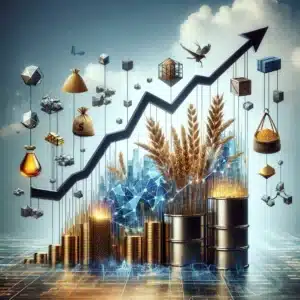Traders and investors turn to commodities and commodity trading as key investment options, seeking to diversify portfolios and hedge against inflation.
Commodities, tangible goods such as gold, oil, and agricultural products, serve as the backbone of global trade, affecting consumer prices and economic indicators.
If you are looking to invest as an expat or high-net-worth individual, which is what I specialize in, you can email me (advice@adamfayed.com) or WhatsApp (+44-7393-450-837).
Unlike stocks and bonds, commodities respond directly to changes in supply and demand, making market analysis and timing crucial for success.
For investors looking at investment options, these assets provide a way to gain exposure to different economic sectors and manage risk in their investment portfolios.
This page will discuss different points, including:
- Commodity meaning
- Types of commodities
- Commodities examples
- Commodity trading
- Commodity Trading Platforms
- Commodity Stocks
- Commodity prices
Commodity Meaning
Commodities are basic goods used in commerce that are interchangeable with other goods of the same type.

Understanding commodities is essential for investors looking at various investment options.
These products influence everyday life and the global economy at a macro level, dictating the prices of goods and services worldwide. They offer investors a way to hedge against inflation, as their prices often rise when living expenses increase.
Types of Commodities
There are various types of commodities available in the market, such as:
- energy commodities
- metals
- agricultural commodities
- livestock
Commodities Examples
Some examples include energy commodities like crude oil and natural gas, which power industries and vehicles; agricultural commodities like wheat, soybeans, and cotton, which feed populations and provide raw materials; and metals like gold, silver, and copper, which serve as investment options and industrial components.
Commodity Trading
Trading in commodities is the purchasing and selling of raw materials or main agricultural products; this is frequently done online or through commodity exchanges.
Commodity trading strategies used are very diverse; they include technical analysis that concentrates on price trends and patterns as well as fundamental analysis that is based on supply and demand dynamics.

Commodity Markets
Commodity markets are platforms where raw or primary products are exchanged.
These markets play a crucial role in global economics by setting prices for these essential goods. They include both physical trading and derivative trading.
Market Participants
Participants in this market include producers and consumers, traders, speculators, and investors. Producers and consumers engage in hedging activities to lock in prices for future delivery, protecting against price fluctuations.
Traders and speculators aim to profit from price movements, while investors may include the assets in their portfolios for diversification and as a hedge against inflation.
Trading Venues
Commodity trading venues and instruments are crucial components of the global financial system, allowing participants to buy, sell, and speculate on the prices of various products such as metals, energy, and agricultural products.
These trading activities take place on regulated exchanges and over-the-counter (OTC) markets, each with its own characteristics, instruments, and participants.
Instruments for Trading
Markets utilize various instruments for trading, like futures contracts, options contracts, forwards, swaps, exchange-traded notes, and exchange-traded funds.
How to Trade Commodities
- Educate Yourself: Learn about the different types and their market drivers. Understand the economic, environmental, and political factors that can affect commodity prices.
- Choose a Trading Approach: Decide whether you want to trade physical commodity, futures contracts, options, or commodity-related stocks and ETFs.
- Select a Broker: Choose a reputable broker. Consider factors such as commission rates, trading platforms, customer service, and educational resources.
- Start with a Demo Account: Many brokers offer demo or simulation trading accounts. Use these to practice trading with virtual money and familiarize yourself with market conditions.
- Develop a Trading Plan: Establish your trading goals, risk tolerance, and strategy. Determine in advance how much you are willing to risk on each trade.
- Stay Informed: Follow market news and reports. Economic indicators, weather reports, and geopolitical events can all influence commodity prices.
Commodity Trading Platforms
Commodity trading platforms vary in features, user interface, and what they offer.
Some popular platforms include:
- MetaTrader
- NinjaTrader
- Interactive Brokers
- Thinkorswim by TD Ameritrade
Commodity Stocks
Commodity stocks represent companies involved in the production, exploration, or processing of commodities.
This connection offers a more accessible way for investors to gain exposure to prices without directly trading physical goods or futures contracts.
Commodity Prices
Commodity price is the market value of raw materials or main agri-products. It is shaped by supply and demand, geopolitical shifts, weather, government policies, and economic patterns.
CNBC Commodities
CNBC, a leading business and financial news network, provides comprehensive coverage on these assets, offering real-time data, news, analysis, and insights into the global commodities markets.
Pained by financial indecision?

Adam is an internationally recognised author on financial matters with over 830million answer views on Quora, a widely sold book on Amazon, and a contributor on Forbes.

